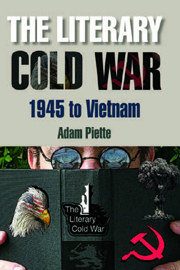Book contents
- Frontmatter
- Contents
- Acknowledgements
- Introduction
- 1 The Special Relationship and the British Hypothesis: The Black Laurel, The Third Man, Cold War Vienna and Berlin
- 2 Cold War on the 1930s and Sacrificial Naming: John Dos Passos and Josephine Herbst
- 3 DEW Line, Uranium and the Arctic Cold War: Ginsberg's Kaddish and Nabokov's Lolita
- 4 Cold War Sex War, Or the Other Being Inside: Burroughs, Paley, Plath, Hughes
- 5 The Sacrificial Logic of the Asian Cold War: Greene's The Quiet American and McCarthy's The Seventeenth Degree
- Conclusion
- Bibliography
- Index
Conclusion
Published online by Cambridge University Press: 12 September 2012
- Frontmatter
- Contents
- Acknowledgements
- Introduction
- 1 The Special Relationship and the British Hypothesis: The Black Laurel, The Third Man, Cold War Vienna and Berlin
- 2 Cold War on the 1930s and Sacrificial Naming: John Dos Passos and Josephine Herbst
- 3 DEW Line, Uranium and the Arctic Cold War: Ginsberg's Kaddish and Nabokov's Lolita
- 4 Cold War Sex War, Or the Other Being Inside: Burroughs, Paley, Plath, Hughes
- 5 The Sacrificial Logic of the Asian Cold War: Greene's The Quiet American and McCarthy's The Seventeenth Degree
- Conclusion
- Bibliography
- Index
Summary
Sir Percy Cradock, chairman of the Joint Intelligence Committee, broke open a bottle of champagne on the news of the failure of the KGB coup against Gorbachev, and remarked, with triumph: ‘We didn't have a war. We did win.’ The Cold War had to be fought, especially in its early stages with a belligerent and tyrannical leader at the head of the Soviet Union, capable of great evil and addicted to the megalomaniac exercise of sheer power. The struggle for control of Europe and the defence of the Third World against Communism on the part of the Western powers was at this level a frank necessity. It is arguable too that the containment policies pursued by the US administrations did have at the very least the measure of the Soviet Union's Stalinist drive towards ideological expansion, totalitarian control and oppression in the name of collective values only an entrenched bureaucratic nomenklatura could enjoy. None of the questions raised in this book about the US and UK during the Cold War can compare with the condemnation that must be levelled against regimes in the Soviet Union and China willing to sacrifice entire peoples to brutal suffering and concentrationary horrors.
What this book does explore are the contradictions forced upon all citizens by the Cold War's nuclear endgames, the sacrificial manoeuvres those citizens internalized under the Cold War's compulsions, and the deadly Janus-faced force that came to inhabit the imagination at the borderline between neurotic inward fear and the superpower-governed public sphere.
- Type
- Chapter
- Information
- The Literary Cold War 1945 to Vietnam , pp. 209 - 214Publisher: Edinburgh University PressPrint publication year: 2009

